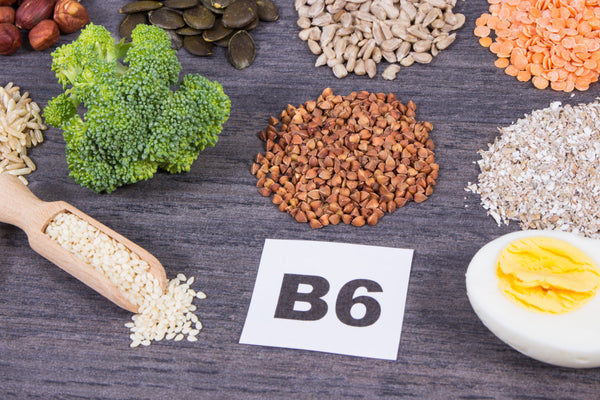
10 Vitamins to Increase Sperm Count

Sperm count can be affected by many factors including smoking, radiation, varicoceles, infections, urinary tract infections, nutrient deficiencies, and oxidative stress. Here are 10 Vitamins to Increase Sperm Count!
This article covers the basics of sperm health and provides information from studies on vitamins, minerals, ayurvedic drugs, and supplements that have been shown to help support healthy sperm counts.
Read: Psst... This Vitamin Can Increase Male Libido!
What is Sperm Count?
The number of sperm is exactly what it sounds: the total number of sperm present in the ejaculation of the male.
The number of sperm is calculated by counting the number of sperm in a small sample of ejaculation and then multiplying it by the total volume of accumulated semen. And do not forget that sperm and semen are different things. Check out the explanation below.
Sperm
Sperm cells (also known as spermatozoa) are male reproductive cells. Sperm has two main components: the head and the tail called the flagellum. Sperm is what fertilizes a woman's egg during fertilization.
Semen
Semen or semen is a male reproductive fluid. Semen is whitish in color and ejaculates from the male reproductive tract during sex. Semen helps keep sperm alive until it has a chance to reach the female egg.
What Counts as a "Normal" Sperm Count?
Normal sperm count may vary depending on several factors. According to WHO, the normal sperm count varies from 39 million at the low end to 928 million at the high end.
Based on the quantity of sperm per milliliter of semen, true oligospermia is the medical term for low sperm count.
- 10 to 15 million sperm/mL is considered mild oligospermia.
- 5 to 10 million sperm/mL is considered moderate oligospermia.
- 0 to 5 million sperm/mL is considered severe oligospermia.
Vitamins to Increase Sperm Count
Malnutrition of various kinds along with oxidative stress can reduce a person's sperm count. Fortunately taking supplements can help overcome nutritional deficiencies and increase antioxidant levels to protect sperm. The following nutrients have all been shown to increase sperm count:
- Vitamin C
- Vitamin B12
- Zinc
- Vitamin D
- Folic
- CoQ10
- Ashwaganda
- Shilajit
- Omega-3 fatty acids
- Lycopene
Below, we will discuss in detail the vitamins, minerals, and supplements mentioned above.
1. Vitamin C
Unlike most other mammals, humans cannot make vitamin C, which means we need to get it through our diet.
Studies show that vitamin C can help improve many parameters of sperm health, including sperm count. In one study, vitamin C supplementation helped double the sperm count of some participants. Study participants also experienced an increase in sperm motility and a decrease in the number of defective sperm cells.
2. Vitamin B12
Vitamin B12 is a pro-metabolic vitamin that is involved in various aspects of cellular energy production.
B12 is very important for the sperm production process. Researchers have found that supplementation with vitamin B12 is just as effective as antioxidant supplements when it comes to supporting healthy sperm counts.
3. Zinc
This mineral is one of the most important micronutrients for men because Zinc has been shown to increase testosterone, increase fertility, and promote muscle growth.
Low zinc levels, on the other hand, have been linked to a decrease in male fertility. Studies show that low zinc correlates with low sperm count, poor sperm quality, and decreased fertility rates.
Fortunately, it is easy to get enough zinc through diet. Eating a lot of red meat, eggs and other animal products should ensure adequate zinc status.
If those foods don't sound appealing to you, or just want to make sure you're getting enough, you should certainly consider some zinc supplements to help support your sperm count.
One more important benefit of zinc: it can help maintain male hormones in the face of intense exercise. Overdoing it in the field or in the gym can lower testosterone levels, by supplementing zinc can help reverse changes you don't want. Zinc's ability to retain T is just one more way that can help support a man's overall fertility and sperm count.
4. Vitamin D
This nutrient is unique in that it is a vitamin and hormone. Vitamin D affects a variety of good physiological functions – including male fertility.
One 2019 review of 18 studies found that men with higher D levels had improved fertility and overall sperm count.
Considering that about 40% of U.S. adults have vitamin D deficiency, ensuring vitamin D intake through food sources and/or sunlight is a wise choice. If you live in a cold or cloudy area, supplements may be necessary.
5. Folate
Folate is another B vitamin that is important for fertility. Some studies have shown that folate supplements can help increase sperm count.
6. CoQ10
Sperm are protected from oxidative stress and other types of destruction by the enzyme and antioxidant CoQ10.
Interestingly enough, Co-Q10 is found in seminal fluid – and higher concentrations correlate with high sperm count and increased sperm motility. Studies show that supplementing with Co-Q10 can increase its presence in the semen, increasing fertility in the process. Other studies have also found that Co-Q10 supplementation increases sperm count.
There's a reason why CoQ10 is highly valued by fertility specialists and is certainly a supplement you should consider adding to your routine when trying to increase your sperm count.
7. Ashwagandha
Withania somnifera, a shrub, is indigenous to North Africa and India. Ashwagandha has been utilized in Ayurvedic medicine for hundreds of years since it has so many beneficial benefits!
Modern science shows us that Ashwagandha contains withanolides and other compounds that can help support fertility. One study found that the use of ashwagandha led to a 53% increase in semen volume, a 57% increase in sperm motility, and a 167% increase in sperm count.
While no one can guarantee a 167% increase for you, adding an Ashwagandha supplement to your sperm count regimen might be a good idea.
8. Omega-3 fatty acids
Omega 3 is an essential fat that has a wide array of health benefits. They provide the right amount of structure for different types of cells, including sperm cells. Studies show that omega-3 levels are strongly correlated with men's fertility health.
9. Lycopene
Lycopene is probably best known as a natural pigment in tomatoes, but it's more than that.
Studies show that this bright red substance can increase sperm count by as much as 70%. Many other fruits are proven to increase sperm count and motility as well.
Consider eating lots of tomatoes or adding supplements that contain lycopene to your daily routine to help support sperm count and fertility health.
Other Tips to Support a Healthy Sperm Count
In addition to the above types of nutrients that can provide a huge boost to your sperm count, lifestyle factors are also important to consider. That's because fertility is directly linked to more common health markers such as energy levels and body composition.
1. Improve Your Body Composition
Consider using a keto or carnivorous diet to promote a healthy weight and potentially increase fertility. Many men who lost weight found that their estrogen levels dropped and their testosterone levels went up.
2. Get Enough Sleep
Both inadequate sleep and poor sleep hygiene have been correlated with a decrease in semen quality. Be sure to sleep at least 7 or 8 hours per night to avoid this state.
3. Limit Alcohol Intake
Heavy alcohol consumption increases estrogen levels, reduces testosterone levels, and can negatively affect fertility. Keep your alcohol use low-moderate if you are trying to increase your fertility naturally.
4. Avoid Eating Too Much Soy
Soy products are rich in isoflavones and other phytoestrogens, both of which correlate with decreased testosterone and lower semen quality.
That’s the information about 10 vitamins to increase sperm count. Hopefully it useful!






